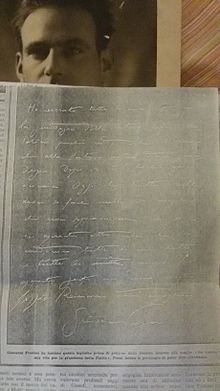Giovanni Preziosi
Giovanni Preziosi (born October 28, 1881 in Torella dei Lombardi , Avellino province , † April 26, 1945 in Milan ) was an Italian fascist politician and influential anti-Semite . The historian Renzo De Felice calls him "perhaps the only real and coherent Italian anti-Semite of the 20th century."
Life
Giovanni came from a petty bourgeois, strictly Catholic family. His father Aniello owned a textile business in Torella dei Lombardi, while his mother came from a wealthy background. Giovanni spent his childhood with his six siblings in the town where he was born, where he later bought real estate.
After graduating from school, he became a priest and was reassigned to the lay status in view of his impending marriage in 1911 , but remained a supporter of conservative Catholicism throughout his life. He became a supporter of Benito Mussolini and took part in the March on Rome in 1922 . Since the end of the First World War , his anti-Semitism increased, whereby he accused the Jews of "double loyalty". He was the first to translate the forged Protocols of the Elders of Zion into Italian . In the magazine La vita italiana , which he founded and which appeared until 1943, he led violent attacks against the Banca Commerciale Italiana because Otto Joel and other Jews were to be found among its managers .
In his youth he developed a strong Germanophobia and in 1916 even published a book entitled Germania alla Conquista dell'Italia (“Germany during the conquest of Italy”). At first he was also an opponent of National Socialism , which he accused of limitation and the responsibility of driving Europe into the arms of communism . After the seizure of power of Hitler but he advocated close cooperation with Nazi Germany and criticized occasionally Italian fascism for allegedly inadequate anti-Jewish measures. After the passage of the Italian Race Laws in 1938, his articles appeared in national newspapers and thus reached a wider audience.
The fall of Mussolini on July 25, 1943 did not take him unprepared, two days later he was in Germany and was received by Hitler . During his several months in Germany he advised Adolf Hitler on Italian affairs, but was also received by Joseph Goebbels . During this time, the Reichsender München broadcast a program of his that could be heard in the Italian Social Republic of Mussolini and in which Guido Buffarini-Guidi and Alessandro Pavolini were attacked as "Jewish friends".
In March 1944, Preziosi returned to Italy and, as inspector general for the breed, established a system of restrictions based on the model of the Nuremberg Laws . Leading fascists and Nazis believed Preziosi to be incapable and Mussolini had long harbored a personal hatred of him, but his efforts ensured that the Italian puppet state would participate in the actions of the Holocaust . Shortly before the end of the war, he committed suicide by throwing himself off the fourth floor of a house in Milan with his wife.
literature
- Giorgio Fabre: PREZIOSI, Giovanni. In: Raffaele Romanelli (ed.): Dizionario Biografico degli Italiani (DBI). Volume 85: Ponzone-Quercia. Istituto della Enciclopedia Italiana, Rome 2016.
- Martin Finkenberger: Preziosi, Giovanni , in: Handbuch des Antisemitismus , Volume 2/2, 2009, pp. 654f.
- Lutz Klinkhammer : Between Alliance and Occupation: National Socialist Germany and the Republic of Salò 1943-1945 . Verlag Niemeyer, Tübingen 1993, ISBN 3-484-82075-6
- Luca Menconi: Giovanni Preziosi e “La vita italiana”: biografia politica e intellettuale. Aracne, Canterano 2018, ISBN 978-88-255-0575-7 .
- Luigi Parente, Fabio Gentile, Rosa Maria Grillo (eds.): Giovanni Preziosi e la questione della razza in Italia: atti del convegno di studi (Avellino-Torella dei Lombardi, 30 November-2 December 2000). Rubbettino, Soveria Mannelli 2005, ISBN 88-498-1364-3 .
- Richard S. Levy : (Ed.): Antisemitism - A Historical Encyclopedia of Prejudice and Persecution . Santa Barbara: abc clio, 2005. Volume 2, pp. 556 f.
- Michele Sarfatti : La Repubblica sociale italiana a Desenzano: Giovanni Preziosi e l'Ispettorato generale per la razza. La Giuntina, Florence 2008, ISBN 978-88-8057-301-2 .
- Thomas Schlemmer and Hans Woller: Italian Fascism and the Jews 1922 to 1945 , in: Vierteljahrshefte für Zeitgeschichte, issue 2/2005, pp. 164–201, online at: [1] (PDF; 8.2 MB)
Individual evidence
- ^ Renzo De Felice : Storia degli ebrei italiani sotto il fascismo , Einaudi, 1961, p. 9.
- ^ A b Giorgio Fabre: Giovanni Preziosi. In: Dizionario Biografico degli Italiani (DBI).
- ^ Giorgio Bassani : The glasses with the gold rim (notes from the Klaus Wagenbach publishing house ), Berlin, 1st edition 2007, ISBN 9783803112422 , p. 137.
| personal data | |
|---|---|
| SURNAME | Preziosi, Giovanni |
| BRIEF DESCRIPTION | Italian fascist politician and anti-Semite |
| DATE OF BIRTH | October 28, 1881 |
| PLACE OF BIRTH | Torella dei Lombardi , Avellino province |
| DATE OF DEATH | April 26, 1945 |
| Place of death | Milan |
